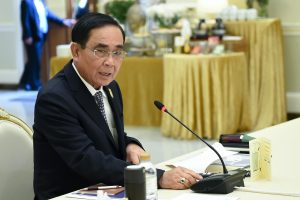Thailand’s political environment is very “Game of Thrones”-like, with regular party switching, bandwagoning, and mergers. Amid the looming general election and the implementation of electoral rules that grant immense advantages to large parties, the making and breaking of alliances have become messier than ever.
Having no political party of his own, Thailand’s prime minister, Gen. Prayut Chan-o-cha, has been relying on support from Palang Pracharath Party (PPRP) since the 2019 general election. PPRP, the largest and most deeply factionalized party in the ruling coalition, has been controlled by Gen. Prawit Wongsuwan, Prayut’s long-time brother in arms who is known to be an accommodationist of many factions’ diverse interests.
Prawit’s accommodating nature towards the opposition camp may have put him at odds with Prayut. While this is a subject of speculation, it is clear that Prayut has started taking independent actions to determine his own political path since the parliamentary no-confidence motion in September 2021, when Prayut faced an existential threat from Prawit’s trusted right-hand man, Captain Thammanat Prompao.
As Sebastian Strangio of The Diplomat wrote early last month, Prayut is now taking steps towards joining Ruam Thai Sang Chart, a new political party piloted by Prayut’s own advisor Pirapan Salirathavibhaga, suggesting that divisions between Prayut and Prawit have gone past the point of no return. Meanwhile, Prayut’s close allies within the PPRP have also started making moves. Among them is Labor Minister Suchart Chomklin, who stepped down from his executive and director role of the PPRP at the end of November.
Strangio noted that as many as 94 MPs could be leaving the PPRP to join Prayut, which is astonishing considering the prime minister’s low public popularity (though, there is a case to be made that his approval ratings have jumped after Thailand’s recent and largely praised hosting of APEC Leaders’ Meeting) and that he is constitutionally not permitted to stay in power beyond April 2025.
With many MPs apparently preparing to leave, the PPRP appears to be a sinking ship. Even so, at a press conference on December 6, the PPRP unexpectedly introduced Mingkwan Saengsuwan from the opposition camp as its new member to handle economic matters – the party’s key weakness. Moreover, Mingkwan is likely to be nominated as one of the PPRP’s prime ministerial candidates (up to three names can be nominated) for the 2023 election.
For many observers, this latest development is difficult to digest because Mingkwan has consistently portrayed himself as a staunch opponent of the Prayut-led coalition government. In the 2019 election, Mingkwan headed the New Economics Party, secured six party-list seats through promises of economic growth, and joined the so-called pro-democracy opposition. Even when New Economics MPs decided to switch to the pro-government camp, Mingkwan remained with the opposition to grill Prayut’s leadership.
Mingkwan’s political turnaround will probably not be the last surprise. At this point, talk about the Prawit-led PPRP allying with the largest opposition Pheu Thai Party (PTP), engineered by the self-exiled former prime minister Thaksin Shinawatra, should perhaps no longer be dismissed. PTP’s official leader Chonlanan Srikaew and Pol. Gen. Sereepisuth Temeeyaves, who leads the third biggest opposition Seri Ruam Thai Party, made similar remarks expressing their openness to working with Prawit back in late October. However, notwithstanding Prawit’s old connections to Thaksin and members of the House of Shinawatra, these developments were not taken too seriously by observers of Thai politics and the Thai public.
Like Prawit, Mingkwan also has old ties to Thaksin. In 2008, Mingkwan was appointed commerce minister and deputy prime minister in the Samak Sundaravej government, which lasted very briefly and was widely seen as a puppet government of Thaksin. But, during the 2011-2014 government led by Thaksin’s sister Yingluck Shinawatra, Mingkwan had no government role and began to fade out of Thaksin’s orbit.
At the December 6 press conference, both Mingkwan and Prawit referred to Prayut’s disentanglement from the PPRP. Precisely, Mingkwan stated that Prayut “is no longer in the party” when abruptly bringing up his prospect as the PPRP’s prime ministerial candidate. Prawit then repeated that “Gen. Prayut is gone,” when asked whether the PPRP would continue to back Prayut as one of its candidates for the post of prime minister.
On the very same day, reporters asked Prayut about his potential shift to Ruam Thai Sang Chart, to which Prayut simply said “it should have been clear by now,” without making an explicit confirmation. And, for the first time in recent months, Prayut expressed his desire to continue serving as prime minister, then find a “suitable successor” to replace him in 2025.
The line “we have no eternal allies, and we have no perpetual enemies,” famously uttered by English Foreign Secretary Viscount Palmerston back in 1848, the middle of Britain’s imperial century, is often quoted to illustrate the complex nature of international politics. This line, too, can be used to depict the confused state of domestic politics in Thailand. Given the current political climate, the outcome of the approaching 2023 national election will be extremely difficult to predict.

































